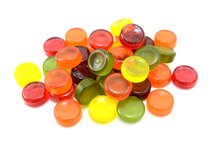What does fact checked mean?
At Healthfully, we strive to deliver objective content that is accurate and up-to-date. Our team periodically reviews articles in order to ensure content quality. The sources cited below consist of evidence from peer-reviewed journals, prominent medical organizations, academic associations, and government data.
The information contained on this site is for informational purposes only, and should not be used as a substitute for the advice of a professional health care provider. Please check with the appropriate physician regarding health questions and concerns. Although we strive to deliver accurate and up-to-date information, no guarantee to that effect is made.
How Much Caffeine Is in McDonald's Sweet Tea?
Caffeine is a stimulant that can lead to anxiety and digestive problems if over-consumed. For healthy adults, 200 to 300 milligrams of caffeine a day, or two to three cups, is safe. Common caffeine sources include coffee, soda and tea, including sweet iced tea from fast food restaurants such as McDonald's 13.
Caffeine Content
McDonald’s sweet tea is made from black tea, which contains 47 milligrams of caffeine per one cup 13. A large serving size contains 30 fluid ounces and 180 milligrams of caffeine, which is within the range of moderate caffeine consumption considered safe. A small iced tea, or 16 fluid ounces, has 96 milligrams of caffeine, and a medium, or 21 fluid ounces, has 126 milligrams of caffeine.
Related Articles
References
- McDonald's: Ingredient List
- National Nutrient Database for Standard Reference: Tea, Black, Brewed, Prepared With Tap Water
- McDonald's: Nutrition Facts
- Zaragoza J, Tinsley G, Urbina S, et al. Effects of acute caffeine, theanine and tyrosine supplementation on mental and physical performance in athletes. J Int Soc Sports Nutr. 2019;16(1):56. doi:10.1186/s12970-019-0326-3
- Higashi Y. Coffee and endothelial function: A coffee paradox? Nutrients. 2019;11(9). doi: 10.3390/nu11092104
- Temple JL, Bernard C, Lipshultz SE, Czachor JD, Westphal JA, Mestre MA. The safety of ingested caffeine: A comprehensive review. Front Psychiatry. 2017;8:80. doi:10.3389/fpsyt.2017.00080
- National Institute on Drug Abuse for Teens. Is caffeine really addictive? Updated 2020.
- The American College of Obstetrics and Gynecology. Moderate caffeine consumption during pregnancy. Updated 2016.
- Kids Health from Nemours. Caffeine. Updated 2017.
- Beydoun MA et. al. Caffeine and alcohol intakes and overall nutrient adequacy are associated with longitudinal cognitive performance among U.S. adults. The Journal of Nutrition. 2014;144(6);890-901. doi:10.3945/jn.113.189027
Writer Bio
Laura Michele Oliver received her bachelor's degree in nutrition from Auburn University. She served as a dietetic intern at Rush University Medical Center in Chicago, where she also graduated with a Master of Science in clinical nutrition. She now works as a registered dietitian in Brooklyn, N.Y.









